
Bedankt voor het vertrouwen het afgelopen jaar! Om jou te bedanken bieden we GRATIS verzending (in België) aan op alles gedurende de hele maand januari.
- Afhalen na 1 uur in een winkel met voorraad
- In januari gratis thuislevering in België
- Ruim aanbod met 7 miljoen producten
Bedankt voor het vertrouwen het afgelopen jaar! Om jou te bedanken bieden we GRATIS verzending (in België) aan op alles gedurende de hele maand januari.
- Afhalen na 1 uur in een winkel met voorraad
- In januari gratis thuislevering in België
- Ruim aanbod met 7 miljoen producten
Zoeken
A Clamor for Equality
Emergence and Exile of Californio Activist Francisco P. Ramírez
Paul Bryan Gray
€ 55,45
+ 110 punten
Omschrijving
A dramatic response to American racism occurred in Los Angeles during 1855 when eighteen-year-old Francisco P. Ramírez published a Spanish-language newspaper, El Clamor Público. Ramírez called upon a Mexican American majority to seize control of their destiny by electing themselves to public office.Ramírez was a radical liberal in a town controlled by white conservative Southerners with antebellum values. Nevertheless, from 1855 to 1859, he railed against slavery and ridiculed those in Los Angeles who supported it. His demands for Mexican equality, the abolition of slavery, free elections, and education for women were well ahead of his time. He was the first civil rights activist in Los Angeles.In December 1859 El Clamor Público bankrupted for lack of popular support. For three decades afterward Ramírez was involved in every major political and social movement of his day. He continued to champion equality and civil rights as a San Francisco newspaper editor and the only Mexican American lawyer in Los Angeles. Ramírez's dramatic entry into public life to his previously veiled years of exile, Gray's illuminating biography speaks volumes about the history of ethnic conflict, politics, and violence in Southern California. From Ramírez's dramatic entry into public life to his previously veiled years of exile, Gray's illuminating biography speaks volumes about the history of ethnic conflict, politics, and violence in Southern California.
Specificaties
Betrokkenen
- Auteur(s):
- Uitgeverij:
Inhoud
- Aantal bladzijden:
- 408
- Taal:
- Engels
- Reeks:
Eigenschappen
- Productcode (EAN):
- 9780896727632
- Verschijningsdatum:
- 15/10/2012
- Uitvoering:
- Hardcover
- Formaat:
- Genaaid
- Afmetingen:
- 168 mm x 236 mm
- Gewicht:
- 725 g

Alleen bij Standaard Boekhandel
+ 110 punten op je klantenkaart van Standaard Boekhandel
Beoordelingen
We publiceren alleen reviews die voldoen aan de voorwaarden voor reviews. Bekijk onze voorwaarden voor reviews.









